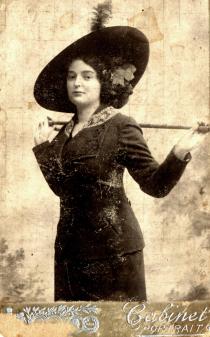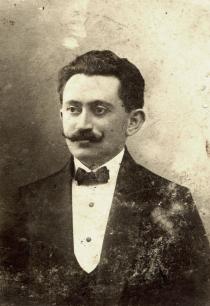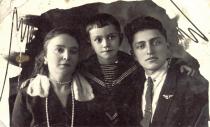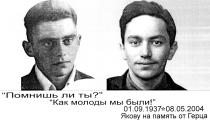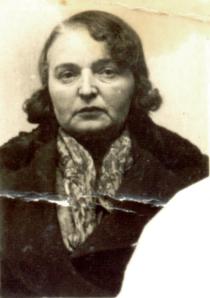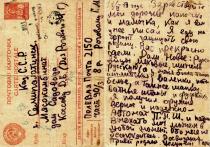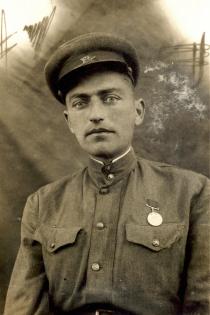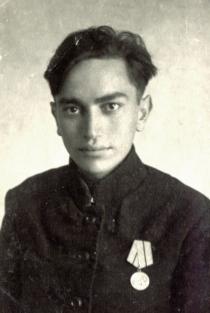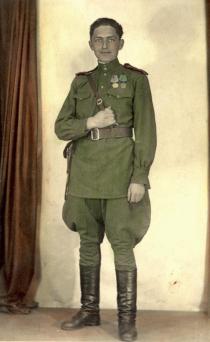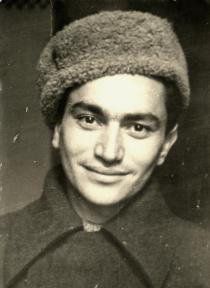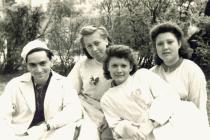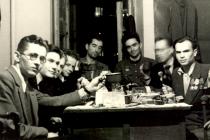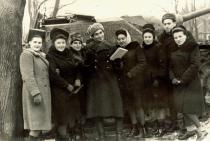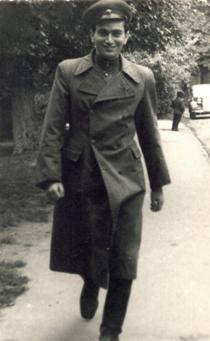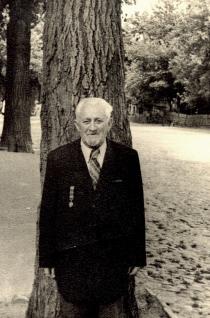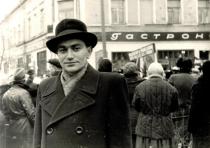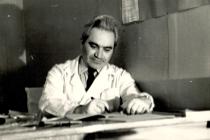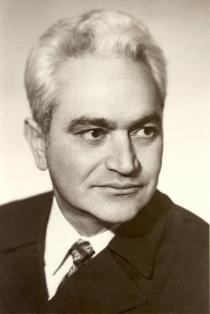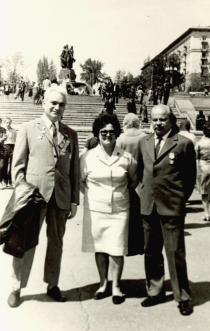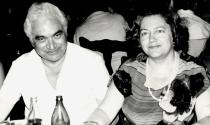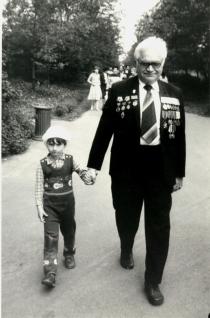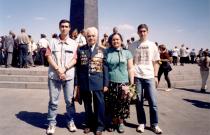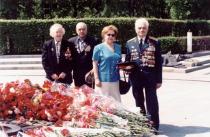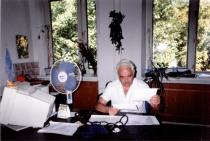This is I, Herz Rogovoy, in the hospital. I sent this picture to my parents, when they were in evacuation. It is written on the reverse side: "30.08.1944 To my dear and beloved parents from their son, Hertz, as a keepsake from the days of war and expected victory". There is a medal on my tunic. It was the first medal and the most precious. I got it for Stalingrad battle. The snapshot was made in Kiev, 1944.
In June 1941 I finished the 9th grade. Summer holidays were to start. On 22 June on 12 p.m., on the radio we found out that the war was unleashed and that Germany attacked USSR at 4 a.m. without declaring war. On July, 10 we received official notices to appear in military enlistment office, and take a spoon, a mug and provision for three days. In 1941 the draftees were to be those who were born in 1922, but the notices were received by those who were born in 1923, 1924 and 1925. Of course, we all strode to the military enlistment office. We were placed in freighter cars to go to miners’ town Slovyansk [550 km from Kiev], not very far from Donetsk. I weighed a little over 40 kilos. Almost everybody was allotted to the collective [Kolkhoz]. We worked in good faith. In September, 1941 we founded out that Kiev was occupied by German troops. We started a siege in Donetskiy, asking to be taken in the army as volunteers. At the age of 17 I joined the army as a volunteer. I was sent to Moscow whereabouts. They fought for Moscow. We belonged to 42nd army. We began from Mozhaisk and reached Istra. These were my first battles. There were few guns in 1941. The battles were fierce. At that time I got my first military award, the medal "For military merits". I was wounded close to Istra during the air raid. During bombing the shell fragment pierced my shoulder-blade. I took it out somehow, but later it started to suppurate heavily and I was sent to the hospital. I stayed there for a month and then I was sent home, because I was not the age of the draftees.
My parents were evacuated in Voronezh oblast [Russsia]. I went there. My parents and I settled in a village not far from Voronezh, 650 km to the east from Kiev. I decided to finish the 10th grade, but did manage since I received the notice to appear in the military enlistment office in 1942. It was drafting of my age. I turned 18. Since I finished 9 grades, it was decided to send to the military school. We were brought to the military school in Balakhna [Russia, 1100 km from Kiev], a town about 50 km away from Nizhniy Novgorod. The studies lasted for 5 months, and then we got the rank of the junior lieutenant. It was the 3rd months when the horrible battle by Stalingrad started. The entire school, 450 people, was sent to Stalingrad. I had never felt more fear, terror and hatred to the Germans during entire war experience. The city was devastated, shells and mortar bombs were aimed at one and the same place, making a powder out of sand. We went by Kalach and I saw the camp of our captured soldiers, frozen to death in dug-outs, with frozen blood, with wounds not being bandaged. I saw huge moats with corpses. Just imagine a moat as deep as 3-storied building, and not the house length, but the block length. In spite of the winter time we could feel cadavers smell.
After Stalingrad Battle I was given two awards for the battle, i.e. medal “for Bravery” and the Order of Red Banner, the second high award after Lenin Order. On February 2, 1943 I attended the meeting, devoted to the exemption of Stalingrad. Only 45 out of 450 people, sent to the front from our school were present at the meeting.
After this battle I was to be conferred the rank of a lieutenant. I was appointed the commander of the 112th platoon the regiment of the 37th Stalingrad Guards division 62, 8. Beginning of 1943 was characterized by fierce battle. It was the period when Germans captured Orel and we had Kursk. At 6 a.m. on March 6, 1943 we called to attack. It was my last fight, I was wounded, and sent to the hospital.

